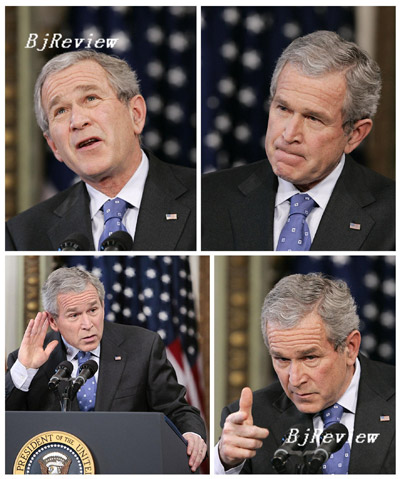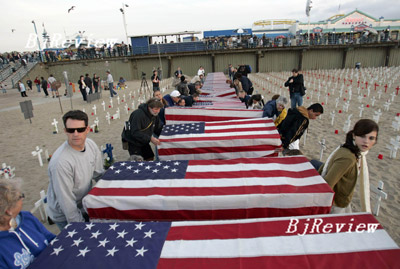
It has been almost four years since the Iraq war began. As conditions in the Middle Eastern country deteriorate and the war becomes increasingly unpopular in the United States, the headache for the White House worsens. Thus, President George W. Bush, in a speech on January 10, issued what his administration calls its "new Iraq policy" in an effort to reverse the situation.
Bush's new policy would establish a series of goals for the Iraqi government to ease sectarian tensions and stabilize the country politically and economically, The New York Times reported on January 8.
The new plan requires the Iraqi Government to set a series of "benchmarks." Among the benchmarks are steps that would draw more Sunnis into the political process, finalize a long-delayed measure on the distribution of oil revenue and ease the government's policy toward former members of the Baath Party of Saddam Hussein. Creating more jobs for Iraqis is also on the agenda.
For the United States, the centerpiece of the plan calls for sending 21,500 more U.S. troops to Baghdad to quell the violence there from February. Media reports indicate that Iraqi Prime Minister Nouri al-Maliki has agreed to match the U.S. troop increase.
Bush would call for $5.6 billion to fund the troop increase, and an additional $1.2 billion in new spending to finance rebuilding and employment programs in Iraq, as an effort to discourage Iraqis from joining the insurgency. The job creation program will provide local officials with funds to put civilians to work as a way of reducing resistance to the U.S. presence in their neighborhoods. By doing so, the Bush administration intends to convince people that its new strategy will emphasize rebuilding as much as fighting.
Will this be enough to reverse the worsening situation in Iraq? Observers are not very optimistic.
As of January 7, at least 3,011 members of the U.S. military have died in Iraq since the beginning of the war in March 2003, according to an Associated Press tally, while some studies have put the Iraqi death toll as high as 600,000. This is only one formidable aspect of the war-torn country.
Some U.S. officials acknowledge deep skepticism about whether the new plan can succeed. Actually, some of the above-mentioned goals are old ones that have never been met. Previous U.S. reconstruction efforts in Iraq have failed to translate into support from the Iraqi population, and some Republicans as well as Democratic leaders have questioned whether a troop increase will work better.
Even if Bush's new plan can be carried out, the situation might not ease very soon. The new American commander in Iraq, Lieutenant General Raymond T. Odierno, said on January 7 that even with the additional American troops likely to be deployed in Baghdad under President Bush's new war strategy it might take another "two or three years" for American and Iraqi forces to gain the upper hand in the war, The New York Times reported.
"I believe the American people, if they feel we are making progress, will have the patience," he said. But right now, he added, "I think the frustration is that they think we are not making progress."

He also hinted that the Iraqi Government is expected to start independently maintaining domestic order at the end of this year, and he also hoped to hand over the security control of 18 Iraqi provinces to the Iraqi Government. Then the role of U.S. troops can be changed to supplying aid.
Zhang Guoqing, a researcher with the Chinese Academy of Social Sciences, concluded that the new policy would be a wise choice because it is the most practical one.
Zhang pointed out that Bush's new policy intended to stabilize the situation by strengthening the Iraqi Government's authority and letting the Iraqi Government take the leading role in reconstruction. "In this way, the U.S. Government can make preparations for withdrawing its troops and ease the security threats in Iraq."
He noted, however, that since Democrats now control Congress, the increase in U.S. troops in Iraq and the budget for the job creation program would face difficulties. Congress has the power to halt Bush's plan by cutting off financial support.
| 